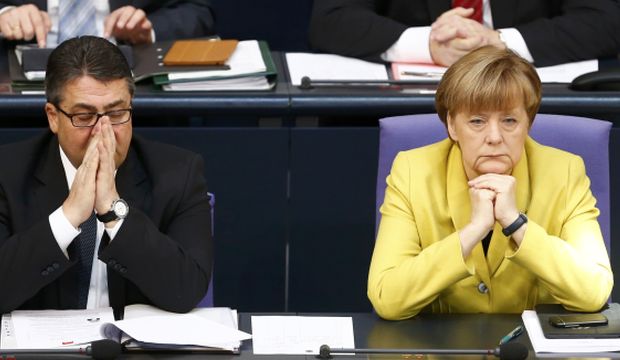
German Chancellor Angela Merkel and Economy Minister Sigmar Gabriel attend a session of the Bundestag, the lower house of parliament, in Berlin on February 27, 2015. (Reuters/Hannibal Hanschke)
Berlin, AP—Germany’s parliament overwhelmingly approved the four-month extension of Greece’s financial bailout on Friday, despite unease over the new government in Athens.
Lawmakers voted 542-32 to back the bailout extension. There were 13 abstentions.
Greece was granted the extension by its European creditors in exchange for a commitment to budget reforms. Germany is among the countries that needed to approve the deal in its national parliament.
“This is not about new billions for Greece, not about changing this program,” Finance Minister Wolfgang Schaeuble assured parliament ahead of the vote. “It’s about providing additional time to complete this program successfully.”
Comments by Greek officials casting doubt on their promise to privatization deals and raising the possibility of further debt relief had irked some in Germany in the run-up to the vote.
Schaeuble said that “we Germans should do everything to keep Europe together and bring it together, as far as we can.”
Germany, a key creditor nation, has nevertheless been among the strongest advocates of unpopular spending cuts and insists aid must come with strings attached.
Schaeuble told lawmakers that the eurozone is on the right track. “We must stick to this course and we must say to our colleagues in Greece that, with all respect for voters’ decision in Greece, Greece alone cannot decide in Europe what the right path is.”
Left-wing Prime Minister Alexis Tsipras ousted traditionally dominant political parties in January 25 elections, promising to scrap bailout agreements and supervision, and demand a massive write down of Greece’s 240 billion-euro (272 billion-US dollar) bailout debt.
However, his government has backed off key demands and secured a bailout extension by pledging a series of policy measures including adherence to certain reforms.
A minority of lawmakers in Chancellor Angela Merkel’s conservative bloc has consistently voted against bailouts for European strugglers. Still, Merkel’s current coalition with the center-left Social Democrats has four-fifths of the parliamentary seats and, with opposition support as well, approval for the bailout extension always looked assured.
“If you’re not traveling in the right direction, there’s no point in always speeding up—you just get further from your destination,” said Klaus-Peter Willsch, a lawmaker from Merkel’s Christian Democrats and a serial rebel in bailout votes.
He pointed to the possibility of a further bailout package for Greece this summer, which Schaeuble didn’t mention, and said that “it will never end.”
Andreas Scheuer, a senior conservative who backed extending the current bailout, said that “everyone has a feeling that isn’t just positive.”
“We will have to rely on the Greek government delivering now,” he said, adding that “this is one of the last chances we are giving Greece.”
